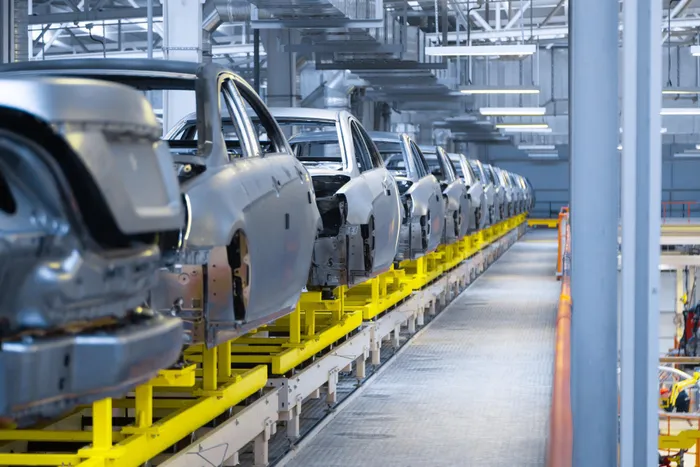US tariffs threaten South Africa's economic growth and job market
Import tariffs

US President Donald Trump's import tariffs will have a severe impact on the number of vehicles that South Africa exports to the US..
Image: Freepik
High tariffs imposed by the US on South African exports from August 1 will be a blow that will further de-industrialise South Africa, kill economic growth, and cause further unemployment, Efficient Group chief economist Dawie Roodt said yesterday.
Speaking in an online discussion held by the Motor Industry Staff Association of South Africa (MISA) about the US’s plans to resume its threat of 30% import tariffs for South African goods, Roodt said the tariffs will result in lower investment into South Africa and will impact manufacturing and agriculture particularly, sectors that are among the most capable of growing job opportunities in the country.
He said while South Africa’s participation in the US’s Africa Growth and Opportunity Act (Agoa) later this year was not formally over and uncertain - Agoa allows duty-free access to the US market for eligible sub-Saharan countries - the new tariffs effectively meant this prospect was unlikely, as the new tariff structure could not co-exist with the benefits of Agoa.
In addition, Agoa had the protection of property ownership rights as a condition of membership, which South Africa could not meet due to its Land Expropriation Act. South Africa was viewed as a medium-income country, and the Act was for less developed economies. “We need to accept that Agoa is dead,” he said.
He said, however, that by appearances, US President Donald Trump’s door was always open for further negotiation on the tariffs, but that the US appears to be seeking political concessions from the South African government.
These likely included changing its outlook on BEE, on land expropriation, and on Israel and Iran, with much of the government’s current views on these matters based on “political grandstanding,” said Roodt.
He said that South African exporters should seek to diversify their markets from the US, and there was growth and potential in China, India, Europe, and Eastern European markets, but there would also now be greater competition in these markets, as many other countries were now also working to diversify their markets from the US.
The government had earlier this month sought to allay fears that the tariffs would be imposed, such as on July 1, when Trade, Industry and Competition Minister Parks Tau said that there was “still room for engagement” with the US.
South Africa is one of 14 countries arbitrarily targeted under this tariff policy. The US is South Africa’s second-largest export market after China, with R157 billion worth of goods exported in 2024, mainly precious metals, vehicles, iron and steel, and aluminium. Over 25 000 vehicles were shipped to the US last year.
FedEx Sub-Saharan African Operations MD Gregory Saffy said one promising avenue to diversify trade is the African Continental Free Trade Area (AfCFTA). “The agreement represents one of the most important levers for driving inclusive growth and unlocking the continent’s full trade potential. Of course, this won’t happen overnight, but we’re optimistic given the early progress being reported,” he said.
Since the start of preferential trade under AfCFTA in January 2024, South Africa’s exports had steadily increased, reaching some R820 million by March 2025. These included mining equipment, household appliances, plastics, apparel, food items, and electrical machinery.
Professor Raymond Parsons of the NWU Business School said: “South Africa is not without remedies. It remains essential that bilateral negotiations must continue to stabilise and consolidate future US-South Africa investment and trade relations. Collaboration between government and the private sector must continue to accelerate the steady identification of alternative markets, for which South Africa must remain globally competitive,” Parsons said.
He said the costs of doing business in South Africa is still too high, and growth-friendly policies must be implemented.
“It becomes even more essential to speedily implement growth-friendly policies that build economic buffers and reduce costs in ways that also enable South Africa to successfully deal with any global setbacks,” he said.
The US is the third-largest destination for South African automotive exports, with about R35bn worth of vehicles shipped in 2024, accounting for 6.5% of total vehicle exports in 2024.
National Association of Automobile Manufacturers of South Africa (Naamsa) CEO Mike Mabasa said they were meeting with the motor manufacturers to get their inputs on the new tariff regime.
However, in April, Naamsa said the proposed tariff increase will severely impact local manufacturers operating in South Africa, including BMW, Ford, Isuzu, Mercedes-Benz, Nissan, Toyota, and Volkswagen, who produce vehicles for global markets, including the US. The US move could have serious implications for jobs and investment in South Africa’s automotive sector.
“The proposed tariff costs cannot be absorbed by manufacturers, resulting in additional costs for US consumers and a reduced choice of South African-produced brands,” Naamsa said.
The National Automobile Dealers Association of South Africa (Nada) said that in the vehicle dealer landscape, there will be few direct impacts, but the indirect risks to the local retail and dealership environment would likely be in terms of the South African Reserve Bank seeking to delay rate cuts in response to macroeconomic uncertainty, adversely affecting consumer confidence and demand.
“It’s worth noting that the early market response has been somewhat muted, with the rand trading slightly stronger against the US dollar… However, history shows such measures ultimately raise prices for US consumers and reduce trade—outcomes that can also feed back into the South African economy and dealership sector in the form of suppressed demand and tighter margins.”
Visit: www.businessreport.co.za